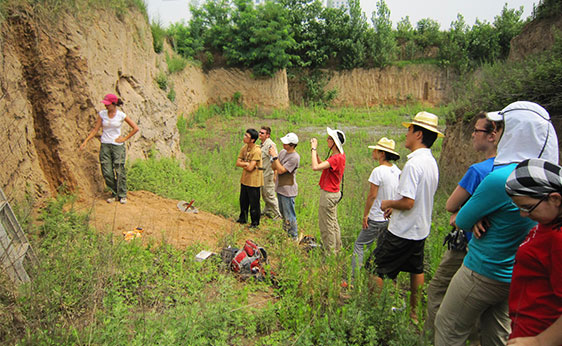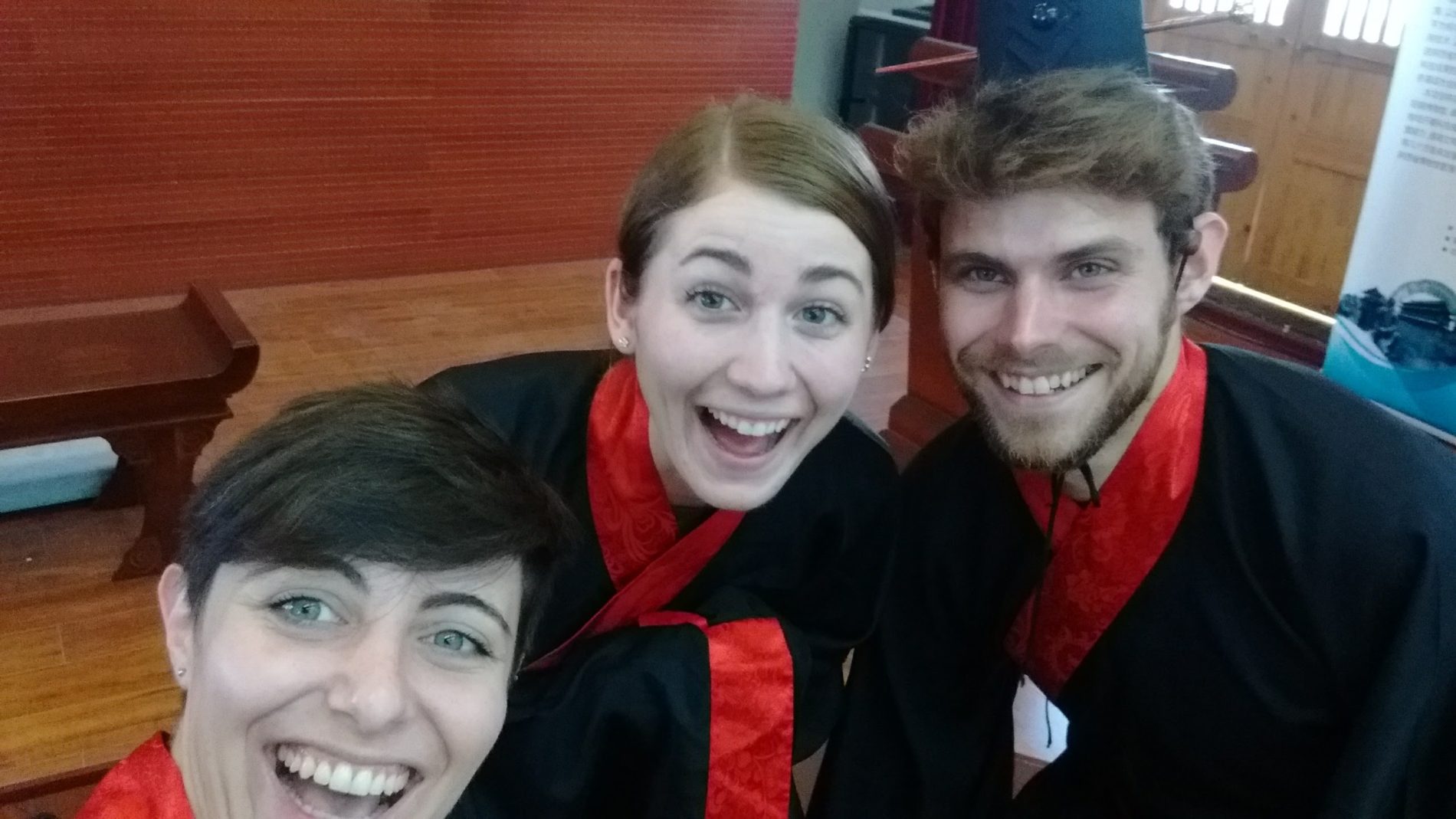Project Description
Overview
The Yangguanzhai Neolithic Archaeological Project focuses on one of the largest known prehistoric villages in China, dating to the Middle to Late Yangshao period (4,000-3,000 BCE). Yangguanzhai is located in the Jing River Valley, approximately 25 kilometers north of the ancient city of Xi’an in northwest China. Excavation of 18,000 sq. meters has revealed a moat, a row of cave dwellings, subterranean houses, child urn-burials, and extensive pottery kilns. Whereas earlier excavations focused on exposing large architectural features, current investigations are focused on evidence for changes in how the Neolithic settlement was used over its long history of occupation. For example, recent analyses of local stratigraphic data and samples collected with micromorphological methods are revealing shifts in uses of key features like moats and pits. These and other data are essential to a fuller understanding of life at different stages of Yangguanzhai’s history and provide an empirical foundation for exploring why behavior changed over time.
The Yangguanzhai project makes evident how archaeological inquiry is truly a multidisciplinary endeavor. Learning and training alongside local Chinese archaeology students, participants in this program are introduced to micromorphological, paleoethnobotanical, zooarchaeological, and geochemical methods.This field school promises a full immersion into the practice of Chinese archaeology through lectures, museum visits, and training in methodologically rigorous field investigations with experienced Chinese archaeologists.
| Course Details | |
|---|---|
| Course Dates | June 16 – July 20, 2024 |
| Course Type | Prehistoric archaeology, Zooarchaeology, Field work |
| Instructors | Dr. Li Yue, Dr. Zhai Linlin, Dr. Zhouyong Sun & Yang Liping |
| Credits* | 8 semester (12 quarter) |
| Apply By | April 1 |
| Fees Due By | Summer 1 (May 1) |
| Program Fees | |
|---|---|
| Tuition | $4,450 |
| Transcript Fee* | $300 |
| Health & Evacuation Insurance | $150 |
| Room & Board | $570 |
| TOTAL: | $5,470 |
*This program may accept students past the deadline. Email admissions@ifrglobal.org for more information.
Instructors
The directors welcome emails and inquiries about the research elements of this project. More general information (tuition, health insurance, and payment schedule) can be found under the ‘Students’ tab above. Any further questions may be addressed to IFR staff. Additional details about research, course schedule, travel, accommodation, and safety can be found on the syllabus. Contacting the directors or the IFR office is encouraged and appreciated. It may help you determine if this field school is a good fit for you.
Testimonials
YGZ gave me the opportunity to see where archaeological data comes from, and to participate in the process of critical-thinking that leads to discovering our shared history. In addition to giving lectures, our instructors patiently taught us proper field techniques, from taking elevations every day to making technical drawings of features. The field school helped me understand that, beyond its excitement and adventure, archaeology really is a slow, methodical process of exploration. And it’s fascinating! I loved how YGZ brought the Neolithic Era to life.
The program also taught me the importance of using a clear and consistent scientific method. We were told to always describe before we interpret. Although this rule may seem obvious, I don’t think I fully understood the importance of this concept before YGZ, when a hasty interpretation could have serious consequences to future research.
As a student of the Chinese language, the field school also presented a great opportunity for cultural immersion and language practice. I loved working with a team of international students and professors–it really showed me how archaeologists collaborate across international borders.
YGZ has been indispensable to me when considering a career in archaeology and cultural heritage. It exposed me to the variety of disciplines within archaeology, especially geoarchaeology, ceramics, paleoethnobotany, and bioarchaeology. Now that I’m in my third year of undergraduate study, I’m seriously considering post-graduate options (such as graduate school or work in cultural resources management). My experiences in YGZ have helped a great deal in discerning what I may do in the future.
The Yangguanzhai field school was a fantastic learning opportunity for my academic and professional goals in archaeology as well as a personally enlightening experience. We got to work with archaeologists trained in Western excavation techniques, which will be immensely helpful in the pursuit of advanced degrees as well as jobs. At the same time we were allowed to work alongside Chinese archaeologists who are trained in uniquely Chinese techniques, allowing for a broadening of our ideas about the variety of ways that archaeology can be conducted and the variation across cultures and nations. These various techniques included everything from survey and excavation to lab methods, such as flotation and the cataloguing of pottery sherds.
The instructors at this field school were also hugely helpful. They were always open and willing to answer our many questions about archaeology, graduate school, and job opportunities. They organized many different trips to museums and lectures to make sure we understood, as much as possible in such a short period of time, the historical context and culture of China at large and the site at Yangguanzhai. This field school was one of the best experiences of my life. It affected me profoundly as a person and allowed me to gain a deeper understanding and appreciation for archaeology.
Payment & Student Fees
Application Fee: There is a $45 fee to submit an online application.
Deposit Payment: A nonrefundable $500 deposit is due within 3 weeks of program acceptance in order to secure your place. The remainder of your program fees are due by the deadline indicated under “Course Details”.
*Transcript Fee & Academic Credit Opt Out: If you wish to participate in an IFR field school without earning academic credits, you will not be charged a transcript fee.
For more information about payment, fees, and policies, please see details under our Payment & Finances and Withdrawal and Cancellation Policy pages.
Accommodations
During the first week of the field school, students will live in a student dormitory at Xibei University in the city of Xi’an. While in the field, students will reside at the Wufulinmen Hotel near the site.
Food is provided Monday to Saturday (breakfast, lunch, and dinner). Students are responsible for their own meals on Sundays. While students are free to obtain their own breakfast and lunch with a daily allowance we provide, all dinners are taken together, since we will use this opportunity to get the whole team together and catch up on the progress of the day. The daily diet in North China is heavily based on rice, noodles, and vegetables. Specialized diets (vegan, kosher, etc.) are difficult to maintain in this location. Vegetarians may find options somewhat limited and should be prepared to be flexible when eating the local food, or should bring supplemental food (e.g. protein bars) if they think it will be necessary.


Travel Info
Natural disasters, political changes, weather conditions and various other factors may force the cancellation or alteration of a field school. IFR recommends students only purchase airline tickets that are fully refundable and consider travel insurance in case a program or travel plans must change for any reason.
General information for this program is below, but keep in mind we will discuss any updated travel information and regulations during the required program orientation, which could affect travel plans.
Students will be met at the Xi’an airport or train station or may travel themselves directly to the Hanting Hotel near Xibei Universit on June 16. Students may travel to X’ian by train or may fly into the Xi’an-Xianyang international airport (XIY). Please note that train tickets often sell out in summer and should be purchased well in advance through a website such as English.Ctrip.com or through a local travel agent. From Beijing to Xi’an, high speed trains leave every 1 to 2 hours throughout the day. If you are unable to purchase the ticket you desire, you can always take a slower train. There are also many domestic flights to Xi’an from other points of entry into China such as Hong Kong, Shanghai, and Beijing, and some international flights go directly to Xi’an.
To make it easier for the program coordinators to meet you at the airport, arrange to arrive on June 16 between 11 AM and 2 PM and email the specific time of your arrival to the instructors beforehand. Those who miss the meeting time can take the public transportation or a taxi to the Hanting Hotel
The hotel address is No. 6 Shunxing Road, Guodu, Chang’an District, Xi’an (西安长安区郭杜顺兴路6号). For those who don’t speak Chinese and like to travel directly to the hotel, please print out the Chinese address and show it to the taxi driver or bus driver after arriving at Xi’an airport or train station.
If you come in from the airport and miss the pick-up time, take the shuttle bus of Chang’an University city Line 长安大学城线to Xibu Dadao Xifeng Lukou西部大道西沣路口, walk 410 m to Bus 311, get off at Jianye Sanlu Xikou建业三路西口,walk 550 m to the Hanting Hotel. The cost is about 30 RMB. If you decide to take a taxi, the cost is 140 RMB (price might change).
If you arrive at Xi’an North Station (the station for most high speed railway lines), take subway line 2 in direction of常宁宫 and get off at Zhong Lou钟楼. From there take subway line 6 in direction of Xi’an Nanzhan 西安南站 and get off at Guodu Xi 郭杜西. From there take bus number S781 in northern direction to Jianye Sanlu Shunxing Lukou 建业三路顺兴路口. The hotel is 80 m north of the stop.
More information will be provided to all enrolled students in the pre-departure online orientation.
VISA APPLICATION
Non-Chinese participants are required to secure a visa to China prior to arrival. You should apply for the visa at least one month ahead of time. You can download your visa application here.
Please see the syllabus for detailed instructions for the visa application.
Student Safety
The IFR primary concern is with education. Traveling and conducting field research involve risk. Students interested in participating in IFR programs must weigh whether the potential risk is worth the value of education provided. While risk is inherent in everything we do, we do not take risk lightly. The IFR engages in intensive review of each field school location prior to approval. Once a program is accepted, the IFR reviews each program annually to make sure it complies with all our standards and policies, including student safety.
Students attending IFR international programs are covered by a comprehensive Health Insurance policy that includes physical illness or injury, mental or chronic conditions. No deductible and 100% of costs are covered up to $250,000. In addition, we provide Political and Natural Disaster Evacuation policy, which allow us to remove students from field school location if local conditions change. Our field school directors are scholars that know field school locations and cultures well and are plugged in into local communities and state institution structures.
Students attending IFR domestic programs (within the US) must have their own health insurance and provide proof upon enrollment. IFR field school directors are familiar with local authorities and if in need of evacuation, local emergency services and/or law enforcement will be notified and activated.
The IFR has strong, explicit and robust policy towards discrimination and harassment in the field. If students feel they cannot discuss personal safety issues with field school staff, the IFR operates an emergency hotline where students may contact IFR personnel directly.
Call us at 877-839-4374 or email us at info@ifrglobal.org if you have questions about the safety of any particular program.



















